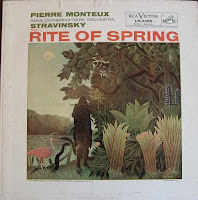Getting Out From Under Cover

To this day, the covers of some records in my father's lp collection remain almost as vivid to me as the music pressed onto the disc. (That Monteux record of the Rite of Spring with the Henri Rousseau "Snake Charmer" on the cover, or that Cal Tjader Latin Jazz concert (pressed onto a deep red disc!) with the cartoon of the band playing in a bullfight arena with a balloon coming out from the crowd shouting "Nixon Go Home!".) Record covers, of course, first got shrunk (into cd covers) and are now becoming nothing more than digital images. For those composers, musicians and listeners who take seriously those ancient commandments against imagery — the iconoclasts —, the emergence of recorded music transmitted without tangible packaging offers an opportunity to deal in music as a commodity without having to cover it with a piece of visual artwork. But the moment appears to be one in which the cover image is having its dues for at least one more round. First, we l...
